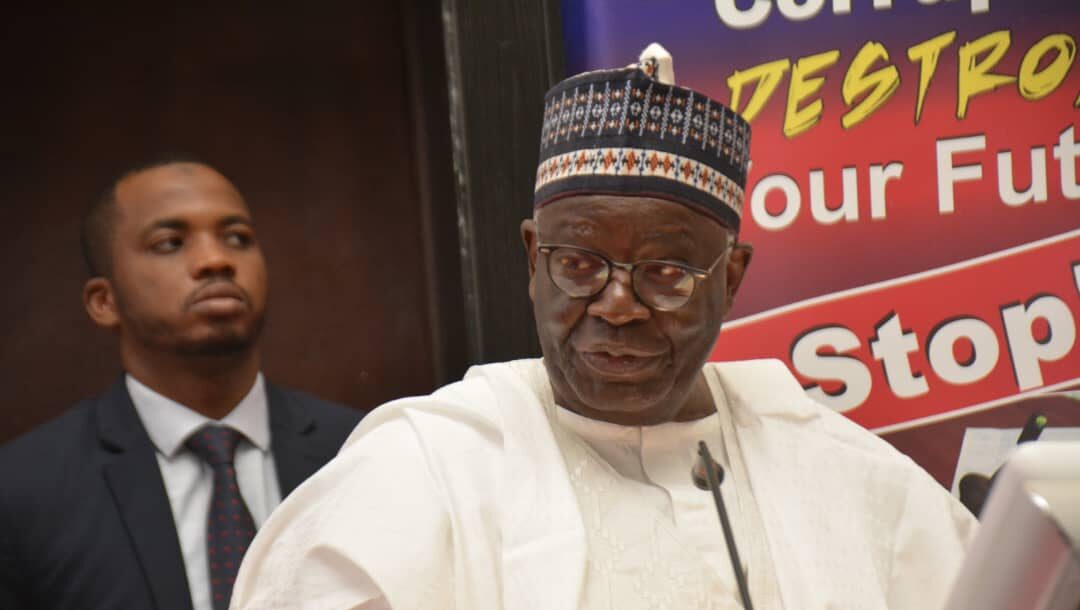Nigeria, Global Coalition Seek International Anti-Corruption Court To Prosecute Kleptocrats, Recover and Repatriate Stolen Assets
The Chief of Staff to the President, Prof. Ibrahim Agboola Gambari, CFR has identified commitment to democratic governance, rule of law and a just society as a recipe for a new Nigeria.
Prof. Gambari proffered the way forward for Nigeria while delivering the Keynote Address at the 44th Annual Conference of the Nigerian Society of International Law held at the Auditorium of the Independent Corrupt Practices and Other Related Offences Commission (ICPC). The conference was attended by dignitaries from Nigeria, Africa and diplomatic corps.
The Chief of Staff, who is a patron and a Fellow of the Society, spoke on the theme of the conference, “Realising the Nigeria of our Dream in Global Governance: The Challenges of Institutional Corruption, National Insecurity, International Law and Democratic Governance”.
The astute diplomat expressed his strong belief that a Nigeria of our dreams was realisable with commitment to democratic governance and evolution from representational democracy to participatory democracy.
He said, “In truth, Nigeria is no more complex than most large developing countries, the adaptive challenge is to fashion a progressive, forward looking ‘Grand Narrative’ as an approximate for ‘our dream’. Presently, there are multiple fractious sub-national plots that have not been woven into a consensual story of who we are, what we are and where we want to be in this fast spinning interdependent future.
“In this regard, promoting a Nigeria of our dreams must begin by a commitment to democratic governance. We have to somehow create consensus on a rational way of governing ourselves. This requires three main elements: establishing the rule of law, evolving from representational democracy to participatory democracy, and building a just society.”
Prof. Gambari emphasised the need for concerted efforts globally to address institutional corruption.
He disclosed that Nigeria, under the leadership of President Muhammadu Buhari, as well as other countries such as Canada, Ecuador and the Netherlands are part of a growing international coalition advocating for the establishment of an international Anti-Corruption Court.
“A group of states could set up an International Anti-Corruption Court (IACC) as a dedicated facility for the international prosecution of corruption cases where national jurisdictions are unable or unwilling to prosecute.
“A new IACC should be an international institution of last resort, like the International Criminal Court, operating on the principle of complementarity. Accordingly, its jurisdiction would extend to the prosecution of kleptocrats due to the inability or unwillingness of national governments to prosecute; it should also wield the power to recover and repatriate assets stolen from victims,” said Prof. Gambari.
The Chief of Staff also advocated the overhauling and strengthening of the Peace Building Commission of the United Nations to enable it engage in a diverse range of peace building actions and to have the authority for resource mobilisation and action.
He, therefore, recommended the upgrading of the Peace Building Commission into United Nations Peace Building Council.
He added, “We recommend upgrading of the Peace Building Commission into United Nations Peace Building Council, empowered with an expanded conflict prevention mandate and possibly having it replace the Trusteeship Council, whose work has been suspended since 1994 – with the independence of Palau, the last remaining UN trust territory.”
Explaining the choice of the theme of the conference, the President of the Nigerian Society of International Law (NSIL), Prof. Yinka Omorogbe, SAN, stated that it took into cognizance of the present-day complexities of Nigeria, the fundamental problems that the country suffers, and their intersections with international law.
Prof. Omorogbe further noted that the foundational problems of Nigeria were rooted in structural deficiencies that centre on governance, which have fuelled and helped create an ecosystem where institutional corruption flourishes to the extent that it is seen to be the norm, thereby affecting all arms of government and the private sector.
The lacunae in governance, according to her, has fuelled the pervading insecurity, rendering the free and easy inter-city and inter-state movements within Nigeria that those in her generation enjoyed in past decades, into nostalgic stories told to the younger generations who never enjoyed those freedoms.
She said, “There is truly the need to reflect. For international lawyers, we feel that international law has an important role to play in attacking present ills in so many ways. A lot of guidance can be drawn from the various principles and standards of international law, and from the various initiatives being driven by the United Nations system.”
Earlier in his welcome address, the Chairman of the Independent Corrupt Practices and Other Related Offences Commission, Prof. Bolaji Owasanoye, SAN, OFR, called for re-energizing of global fight against corruption, averring that corruption was an insidious scourge that had impoverished many countries.
The ICPC boss also recognised corruption as a global threat to national and international peace and security.
“Corruption negatively impacts security, human rights, good governance, the environment, social cohesion, and the prospects for the attainment of the sustainable development goals and Africa’s Agenda 2063.
“The costs of corruption are huge and it remains a primary cause for loss of revenue by developing countries in quantum yet to be accurately articulated. Suffice to say that for developing countries like Nigeria, losses from corruption and illicit financial flows are daily reminders of the need to constantly retool the fight against corruption,” said Prof. Owasanoye who is a long standing member of the Nigerian Society of International Law.
He assured that the anti-corruption agencies in the country, including the ICPC, would sustain the fight against corruption in Nigeria and therefore welcomed the two-day conference of the NSIL.
“We hope that this two-day conference will further enrich ICPC’s quest and thirst for knowledge on new ways by which we can fulfill our mandate, and help the nation improve her governance aspirations with peace and security of all citizens and stability of our neighbours within the bounds of national and international law,” Prof. Owasanoye stated.

